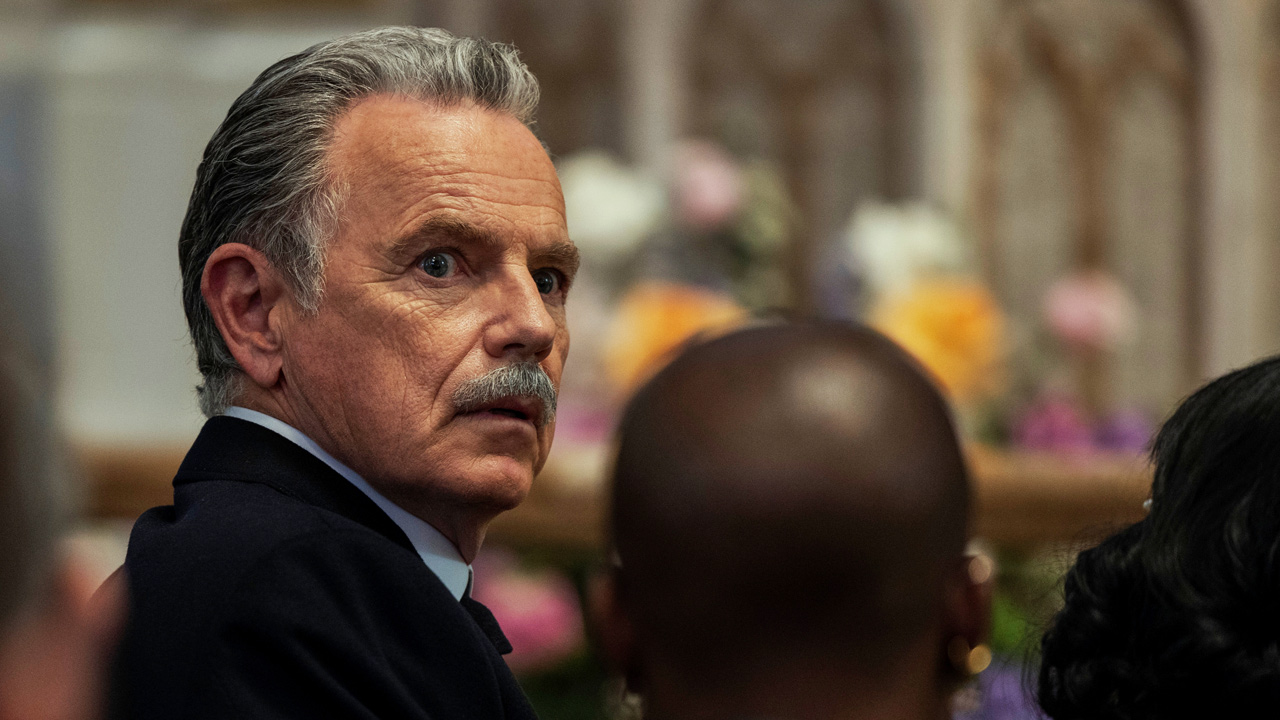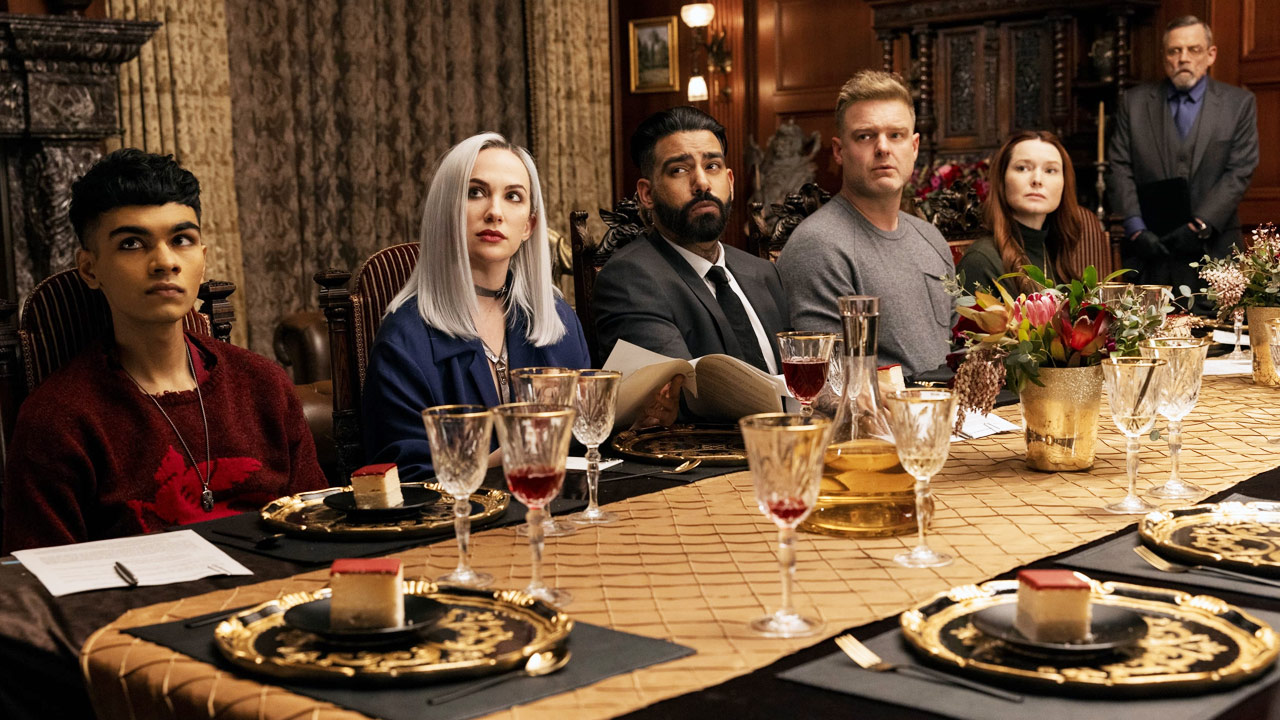The Fall of the House of Usher delivers a megaton of horror spectacle

Any Edgar Allan Poe adaptation must by law include creepy masks and ravens. Mike Flanagan’s new series cranks the volume to 11 and delivers grandly and gruesomely, writes Luke Buckmaster.
Horror maestro Mike Flanagan’s new series The Fall of the House of Usher belongs to the “inspired by” rather than “based on” school of literary adaptations. Firstly due to the sheer breadth of it: while Edgar Allan Poe’s short story of the same name can be comfortably consumed in a single sitting, Flanagan’s show requires an investment north of eight hours. It’s also based in contemporary times, meaning a masquerade ball with a live orchestra of course becomes a nightclub with a bangin’ dance floor. At this club, in a scene from episode two, Prospero Usher (Sauriyan Sapkota) informs a woman at the bar to look for people with red glow sticks: “they’ve got the good shit. Ex, Molly, top shelf stuff.”
When rereading Poe’s story I found not even one measly reference to ex or molly, though there’s plenty of top shelf stuff—in the sense his prose is still, and will always be, amazingly sticky and viscous, oozing from the page like a bubbling potion in a cauldron. A key challenge when adapting the author’s work involves creating a tone that channels the source material’s shuddersome spirit. Violins and creepy masks help. As do conversations about terrible things, conferred in the light of flickering flames. Black cats, too. And ravens, love those ravens. These things aren’t just Poeisms but horrorisms, baked into motion picture language that the author (who died in 1849) predated but nevertheless influenced.
Flanagan, the show’s creator as welll as one of its writers and directors, includes the aforementioned visual elements, and entrenches his narrative in a contemporary context by focusing on a family belonging to a pharmaceutical empire, having made billions by distributing dangerous highly addictive drugs. The way the first episode begins, deploying gnarly rapid-fire montages, suggests one of those nerve-jangling horror experiences that keep jabbing at you, like an aggressive index finger repeatedly inserted into your gut. But the pace settles a little when Bruce Greenwood’s Roderick Usher is introduced, sitting in a cathedral at a funeral for three of his children—who, going by the meagre turn out, were not well loved.
Flanagan introduces an Interview with the Vampire-esque framing device, Roderick sitting down (next to a fireplace, sipping cognac—naturally) and spilling the beans to Assistant U.S. Attorney C. Auguste Dupin (Carl Lumbly), the man who’s been out to get him for years. “I called you tonight to give you the only thing you ever wanted: my confession,” he says. Here the show finds a groove. It could’ve started with this; it didn’t need all the ghastly whoop-de-doo leading up to it. Going forward, the series’ ebb and flow is rather bumpy but I never tired of returning to that fireside anchoring element.

From the outset we know three of Roderick’s children have died. Episodes two to four divulge lengthy flashbacks revealing events leading up to their deaths, and their deaths also—all rather freakish. The second episode homages another Poe short story, The Masque of the Red Death, concluding (no spoilers) with Grand Guignol spectacle so wild the series crosses a threshold, into a crazier domain, where you now know it can do anything, indulge in anything, grab the voodoo doll and rip its head off.
Bruce Greenwood nails the meatiest role, wolfing down some very juicy dialogue—including a deliciously entertaining monologue in the third episode about lemons. Dupin thinks Roderick is about to repeat the old “when life gives you lemons, make lemonade” expression, only to discover the Usher patriarch entering a rant explaining how he could make billions from rebranding the fruit. He’d charge more for organic lemons and conflict-free lemons. He’d make Timothée Chalamet wear lemon shoes at Cannes, and get a Kardashian to suck a lemon wedge in a leaked sex tape. This scene is stagey but irresistible; I wished for more moments like it. There’s a few here and there.
Adding some curiosity to the casting couch is the presence of Mark Hamill as the family’s gruff attorney, who initially does lots of scowling and not much speaking, but whose role widens into a Mike Ehrmantraut-esque cleanup character, albeit on the other side of the law. But everyone pales compared to Greenwood. Not just because his acting is very good, but because the show’s rhythms are unstable, with various performers slipping and sliding out of focus, Roderick (and that framing device) being the closest thing it has to a binding agent.
Across the six episodes I’ve seen so far, The Fall of the House of Usher is a messily entertaining affair, with occasional screeching peaks and not too many troughs. Flanagan and co balance Succession-esque family squabbling and powerplays with detonations of grotesquery. It’s not exactly a “thinking person’s” show but there are things to mull over. Are the Ushers haunted by their own actions, the angry spirits of addicts returning to condemn them? The series is definitely adjacent to Dopesick and Painkiller, but with lots more ghosts, a lot more body fluids, and some very gnarly death scenes.


















